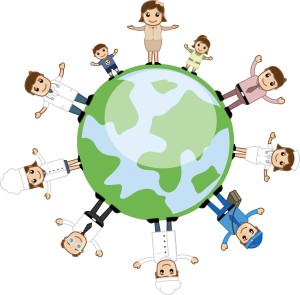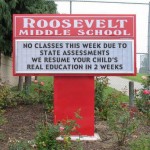 So the test is taken, now what? National standardized tests are given all over the country within the same time frame, ending the school year for some regions, New England being an exception. Long winters extend our school year for a few weeks which provides the extra challenge of keeping staff and students motivated after the AP, IB and NECAP assessments. I wish I could say that our school has a unique, organized, master plan of helping students finish on a high note but we do not. Instead we fill the remaining weeks with a few scattered field trips and more final exams. Wouldn’t it be beneficial to end the year on a high note? To walk out the door with clarity and accomplishment for all involved in education?
So the test is taken, now what? National standardized tests are given all over the country within the same time frame, ending the school year for some regions, New England being an exception. Long winters extend our school year for a few weeks which provides the extra challenge of keeping staff and students motivated after the AP, IB and NECAP assessments. I wish I could say that our school has a unique, organized, master plan of helping students finish on a high note but we do not. Instead we fill the remaining weeks with a few scattered field trips and more final exams. Wouldn’t it be beneficial to end the year on a high note? To walk out the door with clarity and accomplishment for all involved in education?
Before that testing period arrives there are flashcards and afternoon cram sessions, weekend cram sessions, students sporting t-shirts covered in math equations, students singing the dynasties of China. There are timelines drawn on hallway floors and formulas sketched out on hallway windows. Being academic takes prominence, front and center. Students treat the exam weeks as if were the Friday Night Lights, the Big Game. And teachers are right there coaching them. My experience as a teacher of world history, covering 10,000 years of history in a single year has taught me that impossibility is possible. It took considerable effort to set up ongoing student conferences through the summer months, after school, during prep periods and on weekends. Field trips were hosted, content was presented in lectures and presented again in hands on activity. Students need homework that fits their needs; textual, contextual, tangible, virtual and realistic connections are made numerous times with material covered. It would be easier to put the burden of learning on students, to lecture only once and focus on those that keep up as shining examples of our work. I can never walk away feeling that I worked hard enough to give students the best experience, or the best education. So much of oneself goes into the content and the relationships built prior to exam week that the doldrums creep in once the assessment has passed.
Preparing for standardized exams is a metaphorical marathon. In training for a marathon there are several, universal training plans for individuals or groups of runners. Anyone can sign up but faces intense training. It is nearly impossible to finish a marathon without completing a few 20 mile training runs prior to the event. Goals are differentiated but the outcome is the same: the completion of 26.2 miles. Only a few marathons limit the number of runners with qualifying times or lotteries. Out of race of 10,000 or more only one will have an opportunity to win and the rest celebrate their personal accomplishment of finishing. Racing feels good even when it feels bad. And the race recovery period is crucial. Unlike the assessment we deliver students after a full year of training, marathoners are given gift bags, tshirts, medals that they proudly strut in front of peers. Everyone who attempts or finishes is treated like a hero.
If academic exams are marathons, how do schools incorporate celebration? Some school systems nation wide are pioneering programs designed for this sort of positive effort. Students take their finals and based on outcomes they use their final weeks of school for immediate credit recovery or Year End Studies (YES). Teachers make the choice to direct either the remedial studies or create the authentic learning opportunities. YES is a schoolwide collaborative, not the responsibility of a single educator. YES can augment community services and outreach programs. Students have utilized their time to learn online game designs or to work on personalized goals. Building a log cabin, music composition are among projects that caught my attention at other schools in our state. Some students begin internships with state legislature or law firms. Some students apprentice local businesses or volunteer at care centers. Expectations based on personalized learning can be works in progress when the goal is greater than a single test score.
Imagine the possibilities with Maker Faires or STEM spaces. Maker Faires happen all over the country. Make magazine was the inspiration behind these Do It Yourself (DIY) get togethers for artists, scientists and general enthusiasts. Parents donated recycled goods, old clothing scraps, electronics to take apart. Students get into the “make mentality” experimenting ’til their hearts content. STEM spaces function in the same manner. Students tinker with science, technology, engineering and mathematics. Currently, drawing graphite circuits and 3D printing have great appeal with students turning dreams into tangible objects. Faires or Spaces work well when there is an audience. Years ago our school held such an End of Year Open House but it was an idea that dwindled away. What I would do to have our school bring this back.
When schools make a concerted effort to end the year with success in the form of credit recovery and engaging incentives I am certain schools would see increased appreciation for learning from every demographic. Students who need focused attention in particular areas of content could get the assistance they need without adding to the registrar of summer school populations. Students exhausted by the marathon of standardized testing could have time for rest and recovery similar to my AP history students. They learned how to play cricket and watched a few cult classic movies. Soon they will begin a final project by adding Storycorps (storycorps.org) style interviews to our community archives. Students can choose family, friends or educators to interview. They collect recollections of a connection to a world event, choosing images and music to add to their film or podcast. The finished product is a gift to be shared with our school community. And it is something they can take with them wherever they go. It is a small step towards reform happening in a small, rural public high school classroom. While it has yet to be organized school wide I have hope that change is inevitable.




